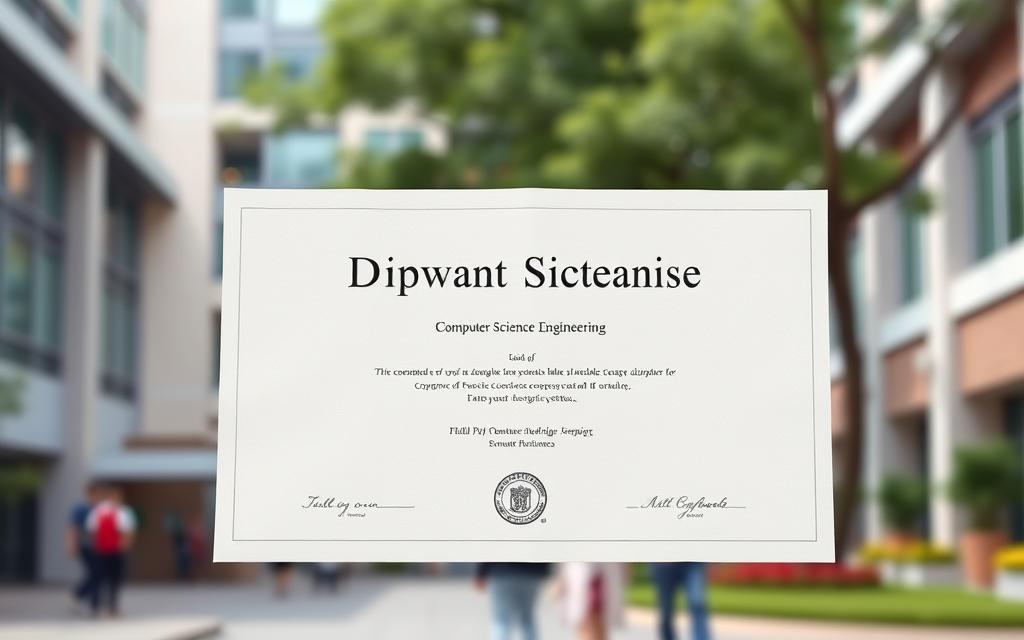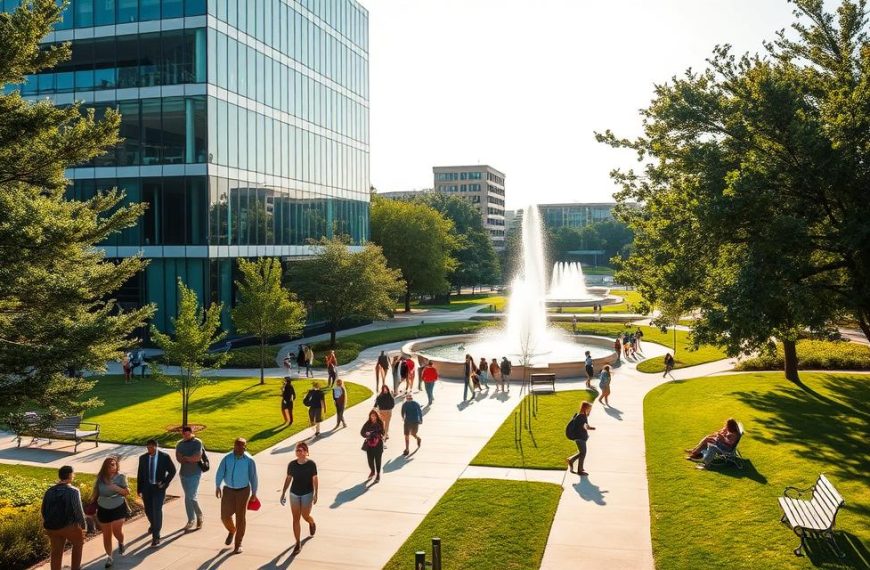An M.Tech in Computer Science Engineering is an advanced degree designed to deepen expertise in cutting-edge fields like AI, cybersecurity, and data analytics. This two-year program blends theory with hands-on projects, preparing graduates for high-demand roles in tech-driven industries.
Specializations include machine learning, cryptography, and human-computer interaction. Universities like Mahindra University tailor curricula for non-CSE graduates, ensuring inclusive access to technology careers.
With a focus on real-world challenges, students collaborate across disciplines—business, law, and engineering—mirroring industry dynamics. Top firms like Google and Facebook actively recruit graduates, underscoring the program’s alignment with global education standards.
What Is M.Tech in Computer Science?
This postgraduate program bridges theoretical knowledge with industry-driven applications. Over four semesters, students master core computer science principles while specializing in high-demand areas like AI or cybersecurity.
Unlike a B.Tech, the engineering master’s degree emphasizes research. A thesis or capstone project is mandatory, accounting for 20–30% of total credits. Electives allow customization based on career goals.
Admission Prerequisites
- Bachelor’s degree in CSE, ECE, or related fields (minimum 60% aggregate).
- Bridge courses for non-CSE graduates to cover foundational gaps.
- Entrance exams (GATE or university-specific tests).
Institutions like Mahindra University collaborate with tech giants to design curricula. Accredited by NBA and NAAC, these programs meet global science engineering standards.
Full-time and part-time options cater to working professionals. The blend of labs, seminars, and internships ensures graduates excel in evolving technology landscapes.
Why Pursue an M.Tech in Computer Science?
Leadership roles in R&D often require deeper knowledge than a bachelor’s degree provides. An M.Tech equips professionals with cutting-edge skills, opening doors to high-growth career paths. From AI to cybersecurity, specialization drives innovation and market relevance.
Advanced Technical Knowledge
Programs focus on emerging fields like blockchain and quantum computing. Hands-on labs and corporate collaborations bridge theory with industry needs. Graduates gain expertise to solve complex problems in smart cities or connected health systems.
Higher Salary Potential
M.Tech holders earn 35–75% more than bachelor’s graduates. Top firms like Google prioritize advanced qualifications for senior roles. Below, see how degrees impact earning potential:
| Role | B.Tech Average Salary (USD) | M.Tech Average Salary (USD) |
|---|---|---|
| Software Engineer | 85,000 | 120,000 |
| Data Scientist | 95,000 | 140,000 |
| Cybersecurity Analyst | 90,000 | 130,000 |
Research and Development Opportunities
Universities partner with tech giants for research projects. Graduates qualify for PhD programs or roles in academic labs. MITAOE reports 90% placement rates, with many hires joining innovation teams.
- Publish papers in AI or IoT journals
- Lead government-funded smart industry projects
- Launch startups with incubator support
M.Tech in Computer Science Curriculum
The program blends rigorous theory with hands-on learning, preparing students for specialized roles. Core subjects and electives are carefully structured to match industry demands.
Core Subjects
Every student masters foundational courses essential for advanced work. Topics include:
- Advanced Algorithms – Optimizing computational efficiency
- Distributed Systems – Cloud and edge computing frameworks
- Research Methodology – Academic and industrial problem-solving
Labs complement lectures, with 40% of credits dedicated to practical work. Universities like Lingaya’s Vidyapeeth integrate AWS certifications into these modules.
Specializations Available
Tailor your expertise with high-impact focus areas:
- Artificial Intelligence – Neural networks, NLP, and robotics
- Data Science – Predictive modeling and big data tools
- Cybersecurity – Cryptography and threat intelligence
Emerging tracks like Quantum Computing are gaining traction. MITAOE offers niche electives in blockchain, giving students an edge.
Capstone projects involve solving real-world challenges, often with corporate partners. This bridges academic learning and industry needs seamlessly.
Career Opportunities After M.Tech in Computer Science
From Silicon Valley startups to defense research labs, opportunities abound for qualified professionals. Graduates leverage advanced skills in AI, data analytics, and security to secure high-impact roles across industries. Below, explore key sectors and salary benchmarks.
Software Development
Software Engineers and Cloud Architects dominate this field. Top employers like Google and Microsoft offer salaries averaging $120,000–$150,000. Emerging roles include:
- AI Ethics Consultant – Ensuring responsible algorithm design
- Blockchain Developer – Building decentralized systems (avg. $98k)
Data Science and Analytics
Demand for data professionals surged by 40% in 2023. Graduates work as:
- Machine Learning Engineers – $140,000 avg. salary
- Quantitative Analysts – Optimizing financial models
Global hubs like Berlin and Singapore actively recruit talent.
Cybersecurity
With rising cyber threats, security experts earn $130,000+. Key roles:
- Threat Intelligence Analyst – Proactive defense strategies
- Cryptography Specialist – Securing government systems (e.g., DRDO, ISRO)
Academia and Research
Graduates pursue PhDs or teach with UGC NET qualifications. Research paths include:
- Publishing in IEEE journals
- Leading NASA-funded projects on AI-driven satellites
University incubators also support career shifts into entrepreneurship.
M.Tech vs. MS in Computer Science
Choosing between an M.Tech and MS depends on career goals and learning preferences. While both are advanced degrees, their focus and outcomes differ significantly.
The MS program emphasizes research and theory, ideal for academia or PhD preparation. In contrast, M.Tech prioritizes technical implementation, aligning with industry roles like AI engineering or cybersecurity.
Key Differences
- Admissions: MS typically requires GRE scores, while M.Tech relies on GATE. Institutions like IIIT Bangalore offer bridge courses for non-CSE applicants.
- Duration: MS programs often span 1.5–2 years; M.Tech is a fixed 2-year program.
- Funding: MS students frequently secure TA-ships, whereas M.Tech candidates gain industry sponsorships.
Global education standards favor MS degrees for academic roles abroad. However, M.Tech holds stronger recognition in corporate sectors, especially in India’s tech hubs.
Career Pathways
- MS: Prepares for PhDs or research scientist roles (e.g., NASA, IEEE publications).
- M.Tech: Leads to senior engineering positions (e.g., Google, startups).
Hybrid options, like dual degrees, blend both worlds. Evaluate costs, immigration benefits, and alumni networks to make an informed choice.
M.Tech vs. MBA: Which Is Better?
Professionals face a critical choice when selecting postgraduate paths: technical mastery or strategic leadership. An M.Tech deepens expertise in AI or cybersecurity, while an MBA builds management acumen for executive roles.
Career Outcomes and Salaries
Technical roles like Machine Learning Engineer offer faster entry into high-paying jobs. MBA graduates often climb the corporate ladder later but reach leadership positions. Compare 10-year salary trajectories:
| Role | M.Tech (USD) | MBA (USD) |
|---|---|---|
| Entry-Level | 90,000 | 85,000 |
| Mid-Career | 130,000 | 110,000 |
| Senior-Level | 160,000 | 200,000+ |
Industry Demand
Tech hubs like Silicon Valley prioritize skills from an M.Tech. Financial centers (e.g., New York) value MBA graduates for strategic roles. Hybrid programs, like MIT’s MBA + Computer Science, blend both worlds.
- Startup Founders: 60% hold MBAs, but tech-focused founders often combine both degrees.
- Product Management: Requires technical knowledge (M.Tech) and leadership (MBA).
- Geographic Flexibility: MBAs dominate consulting; M.Tech grads thrive in R&D clusters.
Top universities like Stanford now offer joint degree programs, reflecting industry demand for versatile talent. Alumni surveys show 78% of dual-degree holders secure VP-level roles within a decade.
Top Universities Offering M.Tech in Computer Science
Leading institutions worldwide provide exceptional engineering programs tailored for advanced learning. These universities combine rigorous courses with cutting-edge research, preparing students for global tech leadership.
India’s NIRF-ranked colleges like IITs and MITAOE dominate regional rankings. International options include Stanford and Georgia Tech, known for their industry-aligned curricula.
Admission Process and Requirements
- Entrance Exams: GATE scores preferred; some universities conduct separate tests.
- Eligibility: Bachelor’s degree with 60%+ aggregate in related fields.
- International Students: TOEFL/IELTS scores required for non-native English speakers.
Top schools like MITAOE offer bridge programs for non-CSE graduates, ensuring inclusive education access.
Funding and Scholarships
| University | Scholarship | Coverage |
|---|---|---|
| IIT Bombay | GATE Fellowship | Full tuition + stipend |
| Stanford | Knight-Hennessy | Full funding + travel |
| MITAOE | Merit Scholarship | 50% tuition waiver |
Many institutions provide teaching assistantships, reducing financial burdens during the learning process.
Key Differentiators
- Industry Partnerships: MITAOE collaborates with IBM for AI labs
- Research Facilities: IIT Delhi’s supercomputing center
- Placement Records: 90%+ placement rates at top NITs
Application deadlines typically fall between December-February for autumn intake. Early preparation ensures smoother admissions processing.
Conclusion
Advanced degrees in computing fields unlock transformative career growth. With 93% of graduates securing roles within six months, the future for skilled professionals is bright. Industries like AI and cybersecurity drive 15% job growth, creating endless opportunities.
This degree delivers long-term value, blending research with real-world development. Specializations align with future tech trends, ensuring relevance in a fast-evolving field. Graduates lead innovation at firms like Microsoft and Infosys.
Prospective students should evaluate programs with strong industry ties. The right choice accelerates career trajectories in our digital world. Start exploring today to position yourself at the forefront of technology.

















